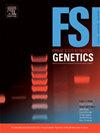Developmental validation of the IDseek® OmniSTR™ global autosomal STR profiling kit.
IF 3.1
2区 医学
Q2 GENETICS & HEREDITY
引用次数: 0
Abstract
Forensic science takes advantage of population variability in autosomal Short Tandem Repeat (STR) lengths to establish human identification. The most common method for DNA profiling by STR is based on PCR, where the highly polymorphic STR regions are amplified and analysed using Capillary Electrophoresis (CE) or Massively Parallel Sequencing (MPS). MPS determines not only the repeat length, but also the repeat structure and variations in the flanking regions, making this method superior in discriminatory power compared to CE. Reverse Complement PCR (RC-PCR) is a novel, more sophisticated PCR based MPS library preparation method combining indexing and PCR amplification in a single closed-tube reaction. In this document we describe the complete developmental validation of the IDseek® OmniSTR™ kit, an RC-PCR based MPS library preparation kit. The developed IDseek® OmniSTR™ kit contains 28 autosomal STR targets, one Y-chromosomal STR and the Amelogenin gene covering all relevant STR core loci from the USA, EU, UK and Interpol.
IDseek®OmniSTR™全球常染色体STR分析试剂盒的发展验证
法医科学利用常染色体短串联重复序列(STR)长度的人口变异性来建立人类鉴定。通过STR进行DNA分析的最常见方法是基于PCR,其中高度多态性的STR区域被扩增并使用毛细管电泳(CE)或大规模平行测序(MPS)进行分析。MPS不仅决定了重复序列的长度,而且还决定了重复序列的结构和侧翼区域的变化,使得该方法的鉴别能力优于CE。反向补体PCR (RC-PCR)是一种新颖的、更复杂的基于PCR的MPS文库制备方法,将标引和PCR扩增在单管封闭反应中结合起来。在本文中,我们描述了IDseek®OmniSTR™试剂盒的完整开发验证,这是一种基于RC-PCR的MPS文库制备试剂盒。开发的IDseek®OmniSTR™试剂盒包含28个常染色体STR靶点,1个y染色体STR和Amelogenin基因,涵盖来自美国,欧盟,英国和国际刑警组织的所有相关STR核心位点。
本文章由计算机程序翻译,如有差异,请以英文原文为准。
求助全文
约1分钟内获得全文
求助全文
来源期刊
CiteScore
7.50
自引率
32.30%
发文量
132
审稿时长
11.3 weeks
期刊介绍:
Forensic Science International: Genetics is the premier journal in the field of Forensic Genetics. This branch of Forensic Science can be defined as the application of genetics to human and non-human material (in the sense of a science with the purpose of studying inherited characteristics for the analysis of inter- and intra-specific variations in populations) for the resolution of legal conflicts.
The scope of the journal includes:
Forensic applications of human polymorphism.
Testing of paternity and other family relationships, immigration cases, typing of biological stains and tissues from criminal casework, identification of human remains by DNA testing methodologies.
Description of human polymorphisms of forensic interest, with special interest in DNA polymorphisms.
Autosomal DNA polymorphisms, mini- and microsatellites (or short tandem repeats, STRs), single nucleotide polymorphisms (SNPs), X and Y chromosome polymorphisms, mtDNA polymorphisms, and any other type of DNA variation with potential forensic applications.
Non-human DNA polymorphisms for crime scene investigation.
Population genetics of human polymorphisms of forensic interest.
Population data, especially from DNA polymorphisms of interest for the solution of forensic problems.
DNA typing methodologies and strategies.
Biostatistical methods in forensic genetics.
Evaluation of DNA evidence in forensic problems (such as paternity or immigration cases, criminal casework, identification), classical and new statistical approaches.
Standards in forensic genetics.
Recommendations of regulatory bodies concerning methods, markers, interpretation or strategies or proposals for procedural or technical standards.
Quality control.
Quality control and quality assurance strategies, proficiency testing for DNA typing methodologies.
Criminal DNA databases.
Technical, legal and statistical issues.
General ethical and legal issues related to forensic genetics.

 求助内容:
求助内容: 应助结果提醒方式:
应助结果提醒方式:


